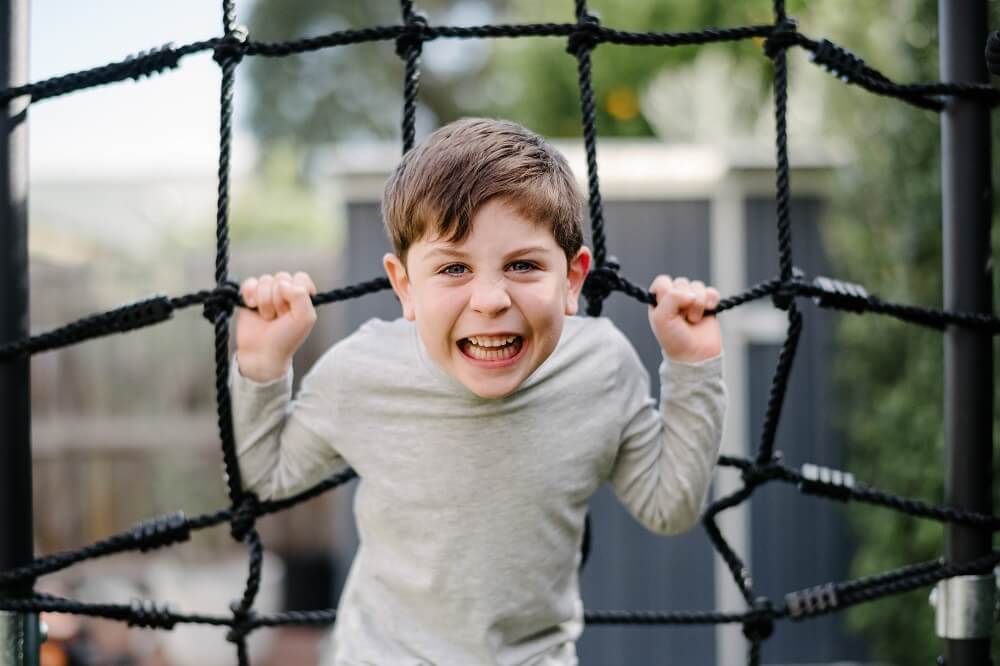Understanding the stages of child development
Key points:
- There is no one-size-fits-all model of child development, but there are a few key stages (and a number of developmental milestones) you should be prepared for.
- Through early childhood, middle childhood, and adolescence, your little one will develop physical, cognitive, social, and emotional skills – and will also assert their independence.
- It’s important to know which factors affecting child development you can’t control – and which ones you may be able to influence.
It never fails. You’re finally starting to understand the little human running wild in your home, and boom. Everything changes. They turn their nose at what used to be their favorite food. Your once calm child launches into an epic tantrum. Your star sleeper wakes in the middle of the night.
Kids develop faster than we can keep up. Some developmental milestones feel like you just won the lottery – the unrivalled joy of a child finally learning to wipe their own butt, for example. Others feel like walking into a minefield (hi, puberty).
Understanding the stages of child development can help you navigate change as it comes – and keep your parent-child bond strong.
The two most important things to know about child development
While it would take several books to even scratch the surface of child development, there are two things to remember above all others:
- Every. Child. Is. Different. Studying child development can help you know what to expect, broadly speaking – when your child might hit key developmental milestones, for example. But it’s essential to note that every child develops at their own pace. (We’ll look at some of the factors that can influence the pace of development below.)
- Child development is about more than physical growth.
Your child’s rapidly growing stature (and all the clothes they grow out of) may be the most noticeable change. But they are growing in other important ways too:
● Cognitive development - The ability to process increasingly complex information and make sense of the world around them - Example: when a child learns how to form a mental image of someone or something, enabling them to understand that people and objects still exist (called ‘object permanence’) – a milestone usually reached in late infancy ● Emotional development - The ability to experience, identify, and manage a widening range of feelings - Example: when an infant or toddler starts showing affection, or when an older child starts using words to express what they are feeling ● Social development - The ability to understand themselves and how they relate to others - Example: when a child makes a new friend, learns to take turns or shares their toys with others
The 3 (or 5, or 7) stages of child development
Some experts define three or four stages of development. Others see as many as seven. For our purposes, we’ll discuss three broad categories: early childhood, middle childhood, and adolescence. Because so much happens in the first stage, we’ll zoom in for a closer, more detailed look.
Early childhood (ages 0 to 7)
Children in this age range often move from one milestone to the next so quickly that you might not always know exactly where one stage ends and another begins.
Infancy (0 to 1)
Don’t blink. Or maybe do blink, because that might be the closest you’ll get to sleep during this stage!
The first phase of childhood is a roller coaster, with some of the most rapid development of your little one’s life:
- 6 months old: your child may be sitting up and grabbing whatever they can get their pudgy little fingers on.
- 9 months old: they’re apt to start exploring, scooting or crawling their way around the place.
- 12 months old: by the time they smash their face into their first birthday cake, your child may be walking (or working out how). They may have also picked up their first couple words.
What you need to know:
If you’re like most new parents, you might worry at first that you’re going to break your new bundle of joy. You won’t. Keep holding, cuddling, and caring for your child. Your confidence will grow with practice.
Your top priority is to keep them safe and nourished. Infants need lots of love and physical contact. Talk to them – it doesn’t matter they can’t understand you. It’s the sound of your voice that counts.
Toddler (1 to 2)
Hold onto your butts. Chances are, your child is fully mobile and into everything. Their vocabulary is expanding at breakneck pace, though they might have a few favorite words… and chances are they’re ‘ME!’ and ‘MINE!’
All this is normal. Your child wants to do things for themselves, but their ability can’t keep pace with their desire. Expect your toddler to have big feelings, and expect some of them to come out sideways.
What you need to know:
The world is an exciting and scary place for a toddler. They need to know you’re their safe space. Don’t overreact when your child has a meltdown – their emotions are too big for their tiny bodies to handle. Give them options when you can, so they have some control. For example, when it’s time to get dressed, let them choose what color shirt to wear.

Preschooler (3 to 4)
Brace yourself. You’re entering the potty training zone. In fact, that’s just one of the new skills your little one might pick up during this stage. They may start communicating in whole sentences. Or try dressing themselves. (Manage expectations when it comes to color coordination and weather suitability.)
You should see your mini-me’s motor skills develop during this stage. Expect their imaginations to take off too, along with the stories they concoct.
What you need to know:
Get ready to be peppered with lots of questions. One in particular: Why?
Be as patient as you can be. It may feel like your preschooler is pushing all your buttons. But they’re also full of genuine curiosity. That trait will serve them well in life. Nurture it. Also make sure your kiddo gets plenty of active (and outdoor) playtime.
Early grade school (5 to 7)
Grab the tissues. (Yep, even those of you who ‘never cry’.) Your little one is heading off to school.
Some kids go happily and never look back. Others glue themselves to your ankles. Your child might be boisterous and outgoing or quiet and reserved. Either way, this stage brings lots of change – and new opportunities for social development. Your child will start forming deeper friendships. They might become more self-conscious, comparing themselves to other kids.
What you need to know:
Give plenty of affirmation and reassurance as your child embarks on new adventures. Their days are more structured now, which can be a gift or challenge, depending on your parenting style. Remember, most kids thrive on routine. Try to follow a consistent schedule, allowing for plenty of rest. Most of all, make sure they know they are loved and heard.
Middle childhood (ages 8 to 12)
Buckle up. Your child’s world is expanding. So are their feelings and the ways they express them. (Prepare yourself for a good dose of eye rolling.) Your child may start to assert their independence as their social circle widens.
What you need to know:
You and your child’s relationship will likely change during this stage. You may start having ‘real’ conversations with them. They might take on more responsibility around the house, helping with simple chores like unloading the dishwasher or cleaning their room. Remember, they’re still a child. They need guidance, structure, as well as plenty of love and affirmation.
Adolescence (ages 13 to 17)
Deep breath. This is where everything changes. (At least, that’s what it can feel like.) Of course, there are the obvious physical changes that come with puberty. Not to mention the much-feared emotional roller coaster of all those hormones firing.
Adolescence is a critical period for your child’s cognitive development. They’re interacting with the adult world now, their brains processing ever more complex ideas.
They may pull away from you as they assert more independence. They will form stronger (and more volatile) bonds with their peers. And of course, they may begin to experience powerful new attractions as they explore an emerging part of their identity.
What you need to know:
Though they might not admit it in a million years, your teenager needs your love and support. They need reassurance that you won’t flake out or give up on them – that you’ll always be there. They may push your buttons with unbridled ferocity. Remember, it’s normal to test limits at this age, as exhausting as that can be for you. They’re the hurricane; you’re the rock.
It’s ok for your teenager to experience the natural consequences of their actions, but the loss of your love and support should never be one of them. They need to know you have their back, especially as their insecurities reach new heights.

Factors that influence your child’s development
As noted earlier, there is no one-size-fits all model of child development. Every child is different. Some of the factors impacting their development come down to nature, while others are a matter of nurture.
Factors you (mostly) can’t control:
- You: more specifically, the genes you pass on.
- Biological sex: different sexes can develop in different ways and at difference paces (though there can also be loads of variation).
- Hormones: these chemicals send messages to your child’s body regulating its growth.
Factors you can influence:
- Nutrition: a steady supply of healthy food has a direct impact on physical and cognitive development.
- Physical activity: your child needs plenty of play to grow physically, socially, cognitively, and emotionally.
- Environment: a host of factors where you live – from safety to environmental quality – can affect your child’s growth (though for some parents, this can understandably be one of the hardest factors to change).
- Family life: families come in all shapes and sizes; the most important thing is that your child has loving, supportive adults in their life.
- Education: education is vital to your child’s growth – the earlier (and the more involved you can be), the better.
Keeping up with your child’s growth can feel overwhelming at times. But by knowing generally what to expect and paying attention to their unique trajectory, you can be a stable, supportive presence for every stage of their growth.
Want to learn more?
Movember launched Family Man to improve the confidence and mental health of dads.
Learn how to master kick-ass parenting strategies by getting started with Family Man. It’s an interactive parenting video series that's expert-backed and funded by Movember.
If research is your thing take a closer look at the evidence behind Family Man.
Or learn more before diving in.